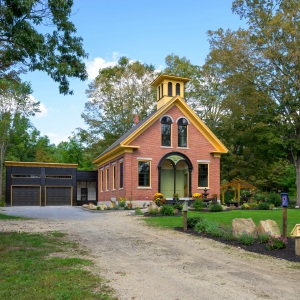Office of Child Advocate looking to add position to address youth homelessness
| Published: 04-09-2024 5:07 PM |
Becca Ivancso knows that a teenager in a tent isn’t often what first comes to mind when people think of homelessness. But that’s the reality for a number of young people in New Hampshire.
There’s no state oversight of these youth, who typically begin experiencing unaccompanied homelessness by 16 years old, said Ivancso, who is the director of the Youth Success Project. A new position in the Office of the Child Advocate is looking to change that.
House Bill 1199, sponsored by Patrick Long, a Manchester Democrat, would fund an additional staff position to focus solely on youth homelessness.
The position would allow for the state to develop and oversee a directory of service providers that work with youth who are currently homeless, at risk or have run away and engage youth with lived experience at the state level.
It would also be the first step to acknowledging that youth homelessness is a problem in New Hampshire and provide a foundation to build out appropriate services, said Erin George-Kelly, the director of homeless youth and young adult services at Waypoint.
“We have to start somewhere by building the beginning stages of a system to address this particular kind of unique need,” she said.
Homeless youth often touch many systems in New Hampshire, said George-Kelly, from the Department of Education to the Division of Children, Youth and Families. This means these young adults can fall through the cracks, with no agency taking full oversight.
“They don’t fit squarely in one buck in our state system,” she said. “This objective outside party can oversee that work and make sure that the systems are working in a collaborative way.”
Article continues after...
Yesterday's Most Read Articles
 Bill to allow ‘no fault’ evictions makes it to governor’s desk
Bill to allow ‘no fault’ evictions makes it to governor’s desk
 Around Concord: Living in an 1856 schoolhouse is (mostly) delightful
Around Concord: Living in an 1856 schoolhouse is (mostly) delightful
 ‘Over-regulation is going to create sneakier kids’: Concord High students react to impending bell-to-bell phone ban
‘Over-regulation is going to create sneakier kids’: Concord High students react to impending bell-to-bell phone ban
 ‘Deep flavor’ – New restaurant in downtown Concord offers creative spin on comfort food and cocktails
‘Deep flavor’ – New restaurant in downtown Concord offers creative spin on comfort food and cocktails
 Around Concord: The Balshaws bring a rustic revival to the Canterbury Country Store
Around Concord: The Balshaws bring a rustic revival to the Canterbury Country Store
 Dunbarton’s ‘Dynamo’: Kristine Flythe brings new life to town recreation activities
Dunbarton’s ‘Dynamo’: Kristine Flythe brings new life to town recreation activities
The system oversight fits neatly into what the state already provides for children involved with the juvenile justice system or DCYF, said Cassandra Sanchez, the state’s child advocate. Expanding her office’s jurisdiction will only help the state protect more children who can be at risk of substance use or sex trafficking, she said.
“There’s a large pool of children that go missing that are not involved,” she said. “Who is truly tracking those children to make sure that they’re safe?”
That was the case for Ivancso when she experienced homelessness. She didn’t use any state services to help her and was enrolled in school at the time. In a sense, her housing insecurity was invisible outside of those who knew her situation.
And that’s the case for many who are involved in the Youth Success Project, a board of young people who experienced unaccompanied homelessness before the age of 25, she said.
“It’s really easy for young adults to fly under the radar and not be identified as homeless,” she said.
The Office of the Child Advocate allows for youth to speak confidentially with staff about what is working well within state systems and concerns they may have. All work is also approached from a trauma-informed lens, meaning that employees are trained to address the lived experiences of these kids and provide them with support and resources.
That framework, allowing for kids to have a voice throughout the process, is currently missing among decision makers, said Ivancso.
“I don’t think that the youth perspective is being heard at the state level,” she said. “Youth are the experts in their lives. They know what they’re talking about, they know their experiences and I think having this position in the state would open the doors for there to be more partnership.”
When the House Finance Committee voted on the bill, though, legislators took issue with the request for a new position that would need to be funded year to year. Instead, Rep. Joe Sweeney, a Salem Republican, suggested the money could be better spent on a one-time expense, like providing more shelter beds.
The new hire would begin Sept. 1, 2024 and be paid an annual salary of $82,000 in their first year. Raises would include $97,000 the following year and $100,000 after that.
While Waypoint’s youth shelter in Manchester is at capacity most nights, providing more beds is a Band-Aid on a systemic issue, said Emily Lawrence, the deputy advocacy director for the nonprofit.
“They don’t just need a bed,” she said. “It’s much more than a bed. It’s case management, it’s support, it’s someone there to help even those young people that we can’t house at night.”
The House Finance Committee voted to kill the bill. However, it will still go to the House floor on Thursday for a full vote.
Lawrence previously worked for the Office of the Child Advocate before moving over to Waypoint just over a year ago. When she first arrived at the nonprofit, more support for youth homelessness from the state was a resounding request from department heads.
In helping draft a proposal for the House Bill, Lawrence also researched other state’s models. In several, there are offices dedicated to work with homeless and runaway youth. But rather than building out a new system, the Office of the Child Advocate in the state could absorb the role, she said.
“It’s a small step for New Hampshire,” she said. “It’s a really cost-effective investment for the state to start to take a look, a closer look.”
The position is the first step in building a framework to continue to talk about support for youth homelessness at the state level. That conversation needs to be frequent, if state leaders want to find solutions to curb youth homelessness.
“We want to be able to provide services and care that are actually effective,” said Lawrence. “New Hampshire often throws money at something without understanding how it can be useful. This position is a way to take stock of what we have for a longer-term vision.”
When George-Kelly thinks of the number of youth experiencing homelessness right now, it’s a small enough population to help. When these kids experience homelessness, it should be rare and brief, she said. And with further state assistance, this position could serve as a preventative measure to provide housing stability at a young age.
“It still feels like a number that we can kind of wrap our arms around and like that we have the ability to impact and if we don’t now, the number is going to grow,” she said. “Our goal is to prevent them from becoming the next generation of chronically homeless adults.”







 Look, up in the sky! It’s… an Airstream trailer?
Look, up in the sky! It’s… an Airstream trailer? Around Concord: Over The Moon Farmstead brings mead, beer, pizza and music to Pittsfield
Around Concord: Over The Moon Farmstead brings mead, beer, pizza and music to Pittsfield
